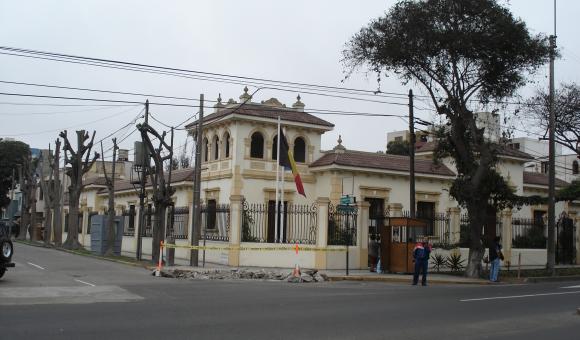Our feeling is one of great solidarity with our compatriots and the victims of the attacks in Brussels on 22 March, as well as their loved ones, but also with the European Union. Europe, which was targeted by the attack on its capital and probably its most powerful symbol. But, we have not forgotten all the victims of terrorism around the world (United States on 11 September, Boston, London, Lahore, Cairo, Tunis and many more).
In comparison to what we experienced in Peru in the 1980s(*) in terms of terrorism, we are convinced that resilience, will, courage and creativity of our compatriots and their allies, will help them to escape this gruesome spiral, the most immediate and most dramatic effects of which were in Paris and now in Brussels. Belgium and its allies survived two World Wars, and they will emerge even stronger from the war against terror. We do not know how long it will take, or the scale of what may come. However, we do know that Belgians work from the inside, but also from the outside to generate the conditions needed to solve the problems with which they are faced, regardless of their size.
On 22 March in Lima, the Delegation from the European Union and Colombia celebrated jointly their entry into a new building with new premises for their diplomatic representations in the presence of many guests.
Owing to the day's events, the ceremony started with a minute's silence and the presentation of the European Union, Colombian and Peruvian flags surrounded by black ribbon and expressions of union, support and solidarity.
All around the world, books of condolences were made available to those who wanted to express their compassion. All around the world, we are working to create the best possible external conditions to help our country and our compatriots to strengthen international bonds of friendship even further. Here, in Peru, we are working to generate another point of anchorage, an alternative, a place where our compatriots, our combined families of Europeans and also many Peruvians find a favourable and warm welcome for mutual benefits in all areas.
Lima is a south-American hub, Belgium is the hub for Europe and many international institutions. Belgians are everywhere, or almost everywhere. Their union, between themselves, with other European countries, such as here through the European chambers brought together in EuroCámaras in Lima, the other nations, with companies, institutions and local populations, generates the levers that create their strength.
On 10 April, in Peru, elections will be held to choose a new President of the Republic. One, or two rounds to choose who will take over this position on 28 July and the Peruvian people will have to choose who between Mrs Keiko Fujimori (Fuerza Popular), Mrs Veronika Mendoza (Frente Amplio Popularpor Juticia, Vida y Libertad), Mr Alan Garcia (Alianza Popular), Mr Alfredo Barnechean (Acción Popular), Mr Alejandro Toledo (Perú Posible), Mr Antero Flores (Orden), Mr Pedro Pablo Kuczynski (Peruanos por el Cambio), Mr Fernando Olivera (Frente Esperanza), Mr Miguel Hilario (Progresando Perú) and Mr Gregorio Santos (Democracia Directa) will lead the country over the next five years. During these same elections, the population will choose the Peruvian delegates and representatives at the Andean Parliament.
It is our duty to support the new destiny that lies ahead for this country, bearing in mind that we are interdependent and will probably carve out our futures better together.
Guy O. Vanackeren
(*) Indeed, a few years ago, we experienced similar situations in Peru, in Lima. 69,000 deaths as a result of terrorism according to the official figures (car bombs, parcel bombs, extortion, murders, etc.) in the 1980s and up until 1992, with a situation in the country at the time that was catastrophic. There were two currency changes with a devaluation in two stages, of one billion (removal of nine figures on banknotes), major frequent and long cuts in water and electricity supplies to the extent that the city of Lima found itself with a sort of symphony of generators.
Despite the forecasts of the end of the country, we persisted and, after a descent into hell, we saw it rise up, float and become a regional example, although it is not yet entirely free of problems.
Today, the country is considered to be stable, with a strong currency, free of extreme poverty with strong growth, which has justified the signature of free trade treaties, including with the European Union and the cancellation of the need for visas for short stays in the Schengen Area


